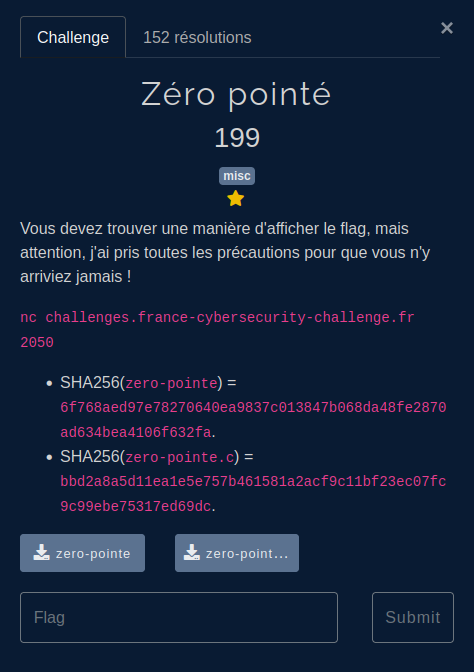Zéro pointé

This chall is a bit of a reverse one. We had two files, one containing the following C code and the other with the compiled version of it:
1
2
3
4
5
6
7
8
9
10
11
12
13
14
15
16
17
18
19
20
21
22
23
24
25
26
27
28
29
30
31
32
33
34
35
36
37
38
39
40
41
42
43
44
45
46
47
48
49
50
51
52
53
54
static void flag(int sig){
(void) sig;
char flag[128];
int fd = open("flag.txt", O_RDONLY);
if (fd == -1) {
perror("open");
exit(EXIT_FAILURE);
}
int n = read(fd, flag, sizeof(flag));
if (n == -1) {
perror("read");
exit(EXIT_FAILURE);
}
flag[n] = 0;
flag[strstr(flag, "\n") - flag] = 0;
if (close(fd) == -1) {
perror("close");
exit(EXIT_FAILURE);
}
printf("%s\n", flag);
exit(EXIT_SUCCESS);
}
long read_long(){
long val;
scanf("%ld", &val);
return val;
}
int main(){
long a;
long b;
long c;
if (signal(SIGFPE, flag) == SIG_ERR) {
perror("signal");
exit(EXIT_FAILURE);
}
a = read_long();
b = read_long();
c = b ? a / b : 0;
printf("%ld\n", c);
exit(EXIT_SUCCESS);
}
As we can see, the flag function is called if the SIGFPE signal is raised. To do so we would need to have a division by 0 for exemple. We have 2 input, a and b and then, the result of a/b is put in the c variable. But before doing the division, the program check if b is different of 0. If so, then the division is done if not, c=0. For that we needed to overwrite the values in a and b. Reading the man we see that LONG_MIN = -9223372036854775808 and LONG_MAX = +9223372036854775807.
To get to 0 in b, we then need to put LONG_MIN - 1 in a and -1 in b. The input value for “a” is outside the range that can be represented by a long data type, and therefore leads to an overflow. As a result, the value of “a” becomes a very large positive number, and the value of “b” remains as -1, which causes a division by zero and triggers the flag() function.
